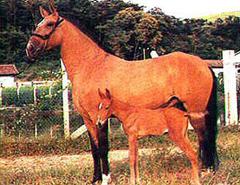Campolina
N/A
Sun, 17th November, 2024 - 5:56 am GMT
Sponsor Ads:

Alternative Name
N/ABasic Info
This mare was Brazilian ( Barb Blood) and was breed by a pure Andalusian stallion belonging to Mariano Procópio who had received it as a present of the emperor Dom Pedro II. Medéia gave birth to a beautiful dark gray colt, a half blood Andalusian, named "Monarca" considered the founder of the Campolina breed.
Health
N/AHabitat
N/ABehavior
N/AOrigin
CanadaHistory
The Campolina breed was formed in Entre Rios de Minas, Minas Gerais in Brazil. The breed was developed by Cassiano Campolina on his farm Fazenda Tamque. Mr. Campolina began his horse operation in 1857, however most people agree that the real development of the breed is 1870 when he received a black mare named "Medéia" from a friend. This mare was Brazilian ( Barb Blood) and was breed by a pure Andalusian stallion belonging to Mariano Procópio who had received it as a present of the emperor Dom Pedro II. Medéia gave birth to a beautiful dark gray colt, a half blood Andalusian, named "Monarca" considered the founder of the Campolina breed. He served during 25 years in the herd of "Fazenda Tanque". Since the beginning, Cassiano Campolina concentrated his work of selection and genetic improvement in obtaining animals of great brio and smooth gait. Not only Monarca but several other stallions of other breeds have also influenced significantly in the formation of the Campolina breed: Menelike ( Anglo-Normand Breed), Golias ( ¼ Clydesdale Breed), Teffer ( Holsteiner Breed ), Yanke Prince ( American Saddle Horse ), Rio Verde ( Mangalarga Machador Breed ), The Mangalarga Marchador breed was used with the purpose of bringing better refinement to the Campolina. In 1934 the herdbook was closed and the introduction of outside breeds was no longer accepted. The Breed Standard was created at this time and the standard was updated in 1975.Common Foods
grassSponsor Ads:
Benchley's Distinction: There are two types of people: those who divide people into two types, and those who don't.
Campolina
Coded by: BGID® | ALL RIGHTS RESERVED Copyright © 2000-2024
Disclaimer | Privacy | Report Errors / Contact | Credits

 Politician, US Vice President and President of the USA - Joseph Robinette Biden Jr.
Politician, US Vice President and President of the USA - Joseph Robinette Biden Jr.  President of the United States of America - Real Estate mogul, Pageant owner and now one of the most controversial men in political history.
President of the United States of America - Real Estate mogul, Pageant owner and now one of the most controversial men in political history.  versus
versus  Russia: 'The Evil Empire'? Are they all that bad or is it just the USA trying to portray Russia as bad because they are a world power with land bigger and a society very different from the USA ideal?
Russia: 'The Evil Empire'? Are they all that bad or is it just the USA trying to portray Russia as bad because they are a world power with land bigger and a society very different from the USA ideal?  Global warming has been in and out as the "latest" hot topic for many years. It is, according to modern scientists, the result of man-made industrial pollutants, clearing forested areas, agriculture, etc. But now they are thinking it started way before the Industrial Revolution...
Global warming has been in and out as the "latest" hot topic for many years. It is, according to modern scientists, the result of man-made industrial pollutants, clearing forested areas, agriculture, etc. But now they are thinking it started way before the Industrial Revolution... 
 Corona virus
Corona virus 
 Users with wide screen monitors can benefit from more content on every page.
Users with wide screen monitors can benefit from more content on every page.